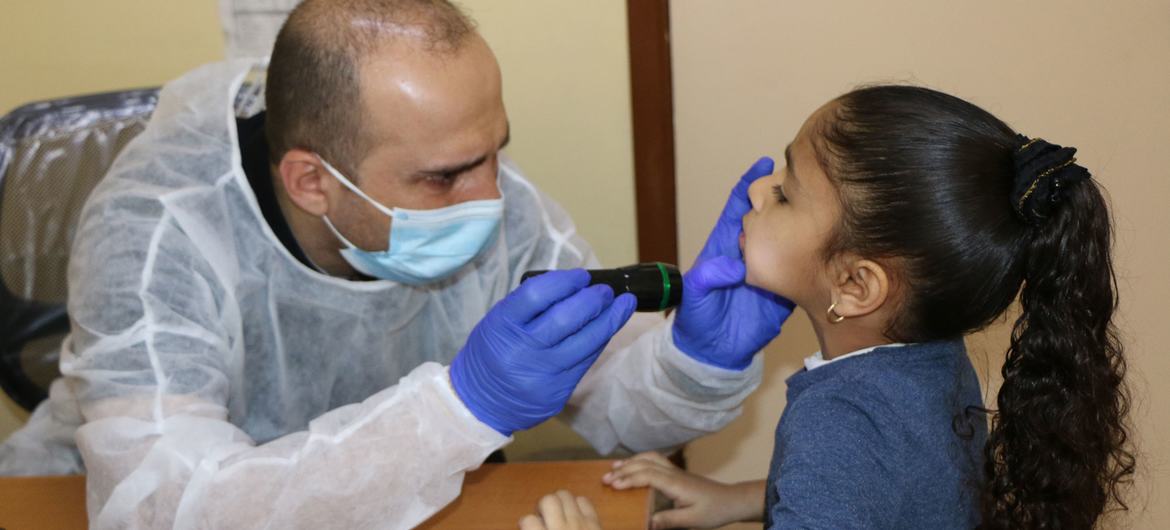Amid a funding crisis, UNRWA’s work in Lebanon could end by March

Cancer patients, young students and families are among the 250,000 Palestinians – 80 per cent already living under the poverty line – who could lose access to lifesaving services in Lebanon by March amid looming funding cuts, the UN agency for Palestine refugees, UNRWA, country director told UN News on Tuesday.
“The agency will no longer have funding as of the end of February, so that means our operations would come to a halt during March,” said Dorothee Klaus, UNRWA Director in Lebanon, describing the “severe impact” of fresh budget cuts.
The funding crisis stemmed from Israel’s allegations that a dozen agency staff were involved in the 7 October attacks that left 1,200 Israelis dead and 250 taken hostage, events that triggered the ongoing devastating war in Gaza.
Several major donors, the United States and Germany among them, suspended funding to the agency pending the UN’s investigation into the matter.
Across the region, UNRWA employs 30,000 staff that serve almost six million Palestinians in Gaza, the West Bank, Jordan, Syria and Lebanon.

‘Nobody capable of taking over’
North of Israel, UNRWA operates in Lebanon like government services would, reaching a quarter of a million Palestinians with such essentials as education, healthcare and garbage collection in some of the refugee camps, where over 100,000 Palestinians live.
“There is nobody capable to take over these services,” Ms. Klaus said.
UNRWA in Lebanon employs around 3,500 staff, which also contribute to the incomes of an estimated 10 to 15 per cent of the Palestine refugee population that is relying directly on the investments that UNRWA makes in the country, a total that amounts to, on average, about $180 million every year.
The UN agency provides cash assistance to 65 per cent of Palestine refugees, which has enabled the agency to bring down poverty from a staggering 93 per cent to currently 80 per cent.
At the same time, about 200,000 Palestine refugees visit agency health centres on an annual basis for services ranging from basic medication to first-response measures for children that need to be immunized, pregnant and lactating women and for the many patients with non-communicable and chronic diseases that are supplied with vital medicines.
‘They have no other place to go’
“Given very high poverty rates, hospitalization would most likely have to be deferred by Palestine refugees because they’re unable to cover the costs, and this also includes 600 cancer patients which rely on UNWRA co-funding,” she said.
The agency has seen an increase in the mortality among cancer patients unable to afford vital medication, making a decision last year to increase the co-funding proportion of UNWRA for that matter, she said.
“They have no other place to go,” Ms. Klaus added.
Without funds, ‘all that would fall away’
If education facilities are closed, 38,000 children in grades one to 12 would be unable to continue their schooling, she said.
The Lebanese Government cannot take up that task, she explained, emphasizing that its already overcrowded classrooms could not handle the influx of new students and are already being used to teach Syrian refugees in the afternoons.
Indeed, without funding, “all that would fall away”, she said. “There is no other actor that has the resources and is capable to step in, given that UNRWA operates like government services for which it now has the respective infrastructure.”
Emergency plan instituted as war grinds on
UNRWA has maintained all of its core services since the outbreak of war in Gaza and amid escalating tensions on Lebanon’s southern border.
“We have enacted a contingency plan; we have prepared 12 of our schools to potentially host displaced persons that have no other place to go, and we have made provisions in terms of pre-positioning food and medical supplies,” she said.
The agency has also provided chronic patients with two months of supplies in advance.
Difficult decisions ahead
Operational centres were established across the country to be able to continue providing services under all circumstances, in parallel with operations over the past months.
But, prioritizing needs will be difficult in the face of budget cuts, she said.
“Any reflections on what would be more essential than something else would put us into very, very difficult decision making,” she said.
“The questions would be: Do we keep the children in school or do we have 600 cancer patients potentially dying? Do we close health centres that immunize newborn babies? Do we not collect the garbage?”
“All of this is indispensable,” she said.














Comment List